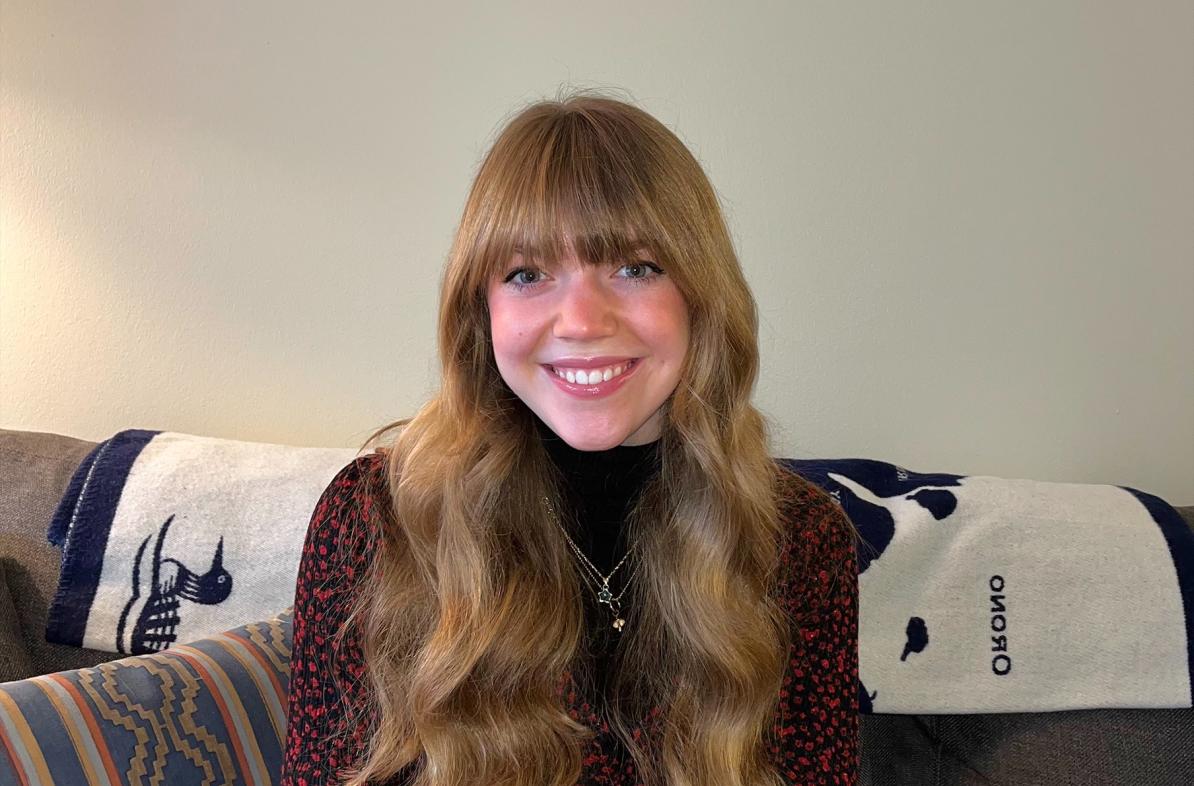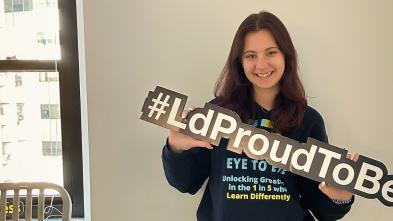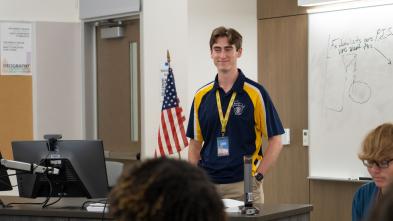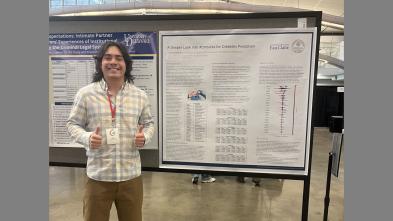
Ecology and environmental biology grad eager to help protect the natural world
When Leandra O’Connell came to the University of Wisconsin-Eau Claire as a freshman, she brought with her both a passion for and curiosity about the world around her.
As she graduates this month with a degree in ecology and environmental biology, she’s even more determined to protect the natural world and to understand people and events in faraway places.
“Studying the environment through the lens of biology has opened my perspective on the inner workings of our environment at a macro and micro scale,” says O’Connell, of Minnetrista, Minnesota. “Studying biology has allowed me to understand the intricacy and sophistication of all types of biological systems.”
A University Honors student and an accomplished student researcher, O’Connell has excelled in and out of the classroom thanks to her “keen” interest in ecology and evolution and her “high level of engagement,” says Dr. Nora Mitchell, assistant professor of biology.
“Leandra is a successful student and researcher because she is both brilliant and balanced,” Mitchell says. “She knows how to manage her time in a way that will enable her to accomplish her goals in the lab/classroom and in her pursuits outside of academia.”
Student researcher
As a Blugold, O’Connell has been involved in research at many levels, from processing samples in the lab to conducting fieldwork in the elements.
However, O’Connell’s “most impressive research contribution” is an extensive literature search to try to understand patterns of hybridization in the largest plant family, Asteraceae, Mitchell says.
O’Connell is looking at certain traits such as life history, ploidy level and growth habit to define patterns associated with hybrids. She has read hundreds of primary literature papers and compiled results as the sole student on the project, Mitchell says.
While the research itself is interesting, O’Connell says the project also is helping her build skills that will be valuable in the future. For example, she’s gained skills in primary literature comprehension, public speaking, data management, topic mastery, scientific writing, and graph and figure building, she says.
“My research project and the eventual paper will allow for immense skill building and exposure to the entirety of the scientific research process, from project beginnings to eventual publication and presentation,” O’Connell says. “Also, this project allowed me to truly understand what a successful publication may look like, which will benefit me immensely as I pursue graduate school.”
Already, O’Connell has presented her research on the UW-Eau Claire campus and at the international Botanical Society of America conference in Alaska.
“It was very rewarding and exciting to present my research, as all of the viewers of my poster were very kind, complimentary and engaged,” O’Connell says. “This showed me that science does not have to be intimidating and is rather an exciting process that should be led with a passion to learn.”
During the conference in Alaska, “many senior researchers were impressed by her work and thought she was a Ph.D. student,” Mitchell says.
University Honors student
The University Honors program also was an important part of her college career because it helped her “connect with professors and their expertise” in ways that can’t happen in other classes, she says.
Since faculty teach courses on specific topics that align with their own interests and experiences, Honors courses are “rich and immersive,” O’Connell says. The program gives students opportunities to study topics and ideas that are outside their academic programs, which allows them to “connect with new ideas that can lead them down new, exciting paths they may have never foreseen,” she says.
By seeking out diverse courses on topics that interest her, O’Connell made the most of the Honors Program, says Dr. Heather Fielding, director of UW-Eau Claire’s University Honors program.
“Leandra is someone who really took advantage of the interdisciplinary courses we offer — she is someone who exemplifies intellectual curiosity,” Fielding says.
For example, O’Connell enrolled in a class Fielding is teaching on Ukraine because she’s “interested in learning about a topic relevant to current news of the world.” Knowing that Fielding has lived in Ukraine and studied the country extensively made it even more interesting, O’Connell says.
“I wanted to contextualize a topic I was hearing about in the news from the lens of someone who traveled in Ukraine and studies their history, culture and literature,” O’Connell says. “I was excited to learn about Dr. Fielding’s expertise, as I love learning about topics that professors are passionate about.”
Finding her place on campus
Among the many reasons O’Connell was drawn to UW-Eau Claire is its size. The campus is big enough that students can “grow and expand their horizons,” yet it also offers smaller classes that make it easier to build relationships with faculty, O’Connell says.
As someone who is “very passionate about our environment,” O’Connell says her ecology and environmental biology major was a great fit. She especially liked that many classes included field trips, allowing her to “experience the beauty of Wisconsin,” while also using what she learned in the classroom in the real world, specifically in the natural areas of Wisconsin.
Meeting faculty, staff and other students who share her passion for and commitment to the environment also was a highlight of her time on campus, O’Connell says.
“I’ve had the opportunity to meet so many kind and thoughtful students who I know are doing their part in making the world a better place,” O’Connell says. “I have also had the honor of learning from a diverse array of professors who each bring their own unique perspectives and ideas to courses.”
O’Connell says she appreciates the professors and mentors whose “support, kindness and belief in my abilities as a researcher, academic and leader uplifted me as I worked on my undergraduate degree.”
In addition to Mitchell and Fielding, the late Dr. Jarrod Hyam, an associate lecturer in philosophy and religious studies who passed away in May, also was a wonderful mentor, O’Connell says.
UW-Eau Claire also is a good fit for her because it offers “fair tuition and many opportunities for scholarships that allow students from any financial background to succeed without being bogged down by extreme debt,” O’Connell says.
She’s especially grateful for the UW-Eau Claire Foundation scholarship donors and sponsors who supported her, O’Connell says.
As a Blugold, O’Connell has received the Ralph E. Duxbury Biological Sciences Scholarship, College of Arts and Sciences Women in Science Scholarship, Kell Container Corp. Faculty/Student Collaborative Research Scholarship, Leoba Hogan Scholarship for Scientific Research, William E. Slagg Scholarship, William E. Nelson Memorial Scholarship and the Colonel Brown Memorial Scholarship.
“The support of these scholarships has been the accomplishment I am most proud of overall,” O’Connell says. “Each scholarship showed me that someone believed in me, which gave me the push to keep working hard.”
Looking ahead
After graduation, O’Connell plans to work as a caregiver while she looks for a job that will offer the kinds of experiences and skill building that will help “propel me forward in the science field.”
Eventually, she plans to enroll in a graduate program that focuses on plant sciences and then pursue a career in research.
Mitchell, her professor and research mentor, believes O’Connell will accomplish whatever she sets out to do in the years ahead.
“Leandra is equipped with the skills and fortitude to excel in many different areas after graduation, and I’m excited to see where she ends up next,” Mitchell says.
You may also like


